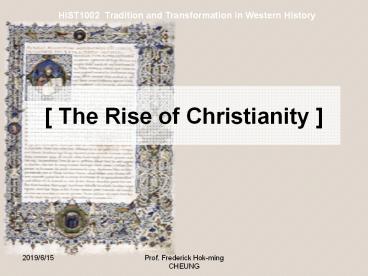[ The Rise of Christianity ] - PowerPoint PPT Presentation
Title: [ The Rise of Christianity ]
1
The Rise of Christianity
HIST1002 Tradition and Transformation in Western
History
2
Background
- Roman Empire
- 3rd 4th centuries - internally, anarchy
economy declining - Externally, barbarian invasions
- ?spiritually, looking for new relief,
liberation - promises------ salvation, eternal life
- yet, with precedent examples
- Egypt Isis (resurrection)
- Persia Mithras (dualism)
- Plato unmoved mover, uncaused cause. (prime
mover) monotheism
3
Background
- Jesus charismatic, a prophet, a preacher, a
teacher, a social worker (?), the son of a
carpenter, humble (not legendary). - Historical person------warm, magnetic leader
- Miraculously healed the sick,
- raised the dead
- stilled the wind
- Amazing Grace
4
Hebrew Monotheism
- Hebrew monotheism well-grounded, strong ideology
- Discipline organization
- Appealing to the majority the poor women
- had powerful appeal to the distressed,
down-trodden, disinherited, despairing. - Equality of all men all men are brothers
- No distinction slave freepoor rich
- ?appealed especially to the poor.
5
The Rise of Christianity
- Luke 14 8-11
- For everyone who exalts himself will be humbled,
and whoever humbles himself will be exalted. - Blessed are the sorrowful, for they shall find
consolation, Blessed are the merciful, for they
shall obtain mercy. - ?Hope promises
- ------Life beyond death in the Kingdom of God
(Heaven) salvation eternal life?? - Love, forgiveness, charity
6
Luke 6 20-29
- Love your enemies, do good to those who hate
you, bless those who curse you, pray for those
who treat you spitefully. - When someone hit you on the cheek, Offer him the
other cheek, too. When a man takes your coat, let
him have your shirt as well. - Treat others as you would like them to treat
you. - Love thy (your) neighbors as thyself.
7
Favorable Condition for Spreading
- 1st century Pax Romana
- Roman Empire------united, good roads,
(communication) - Peter Paul (good leaders)
- architects of the Christian Church
- flexible
- preached without regards to the races (not just
for the Jews) - ?no circumcision (??)
8
Persecutions
- not thorough, inconsistent
- uncompromising attitude of the Christians?martyrs
(??) - impressive stimulating
- ____________________________________
- Constantine Legalized
- Christianity in A.D.312 (Edict of Milan)
- Theodosius (r. 379-395)
- Christianity became the only religion in the
Roman Empire
9
Latin Doctors
- St. Ambrose (c. 340-397)
- Bishop of Milan (?????)
- administrator, orator, theologian
- Plato, ?
- Cicero, ? ?? Christianity
- Virgil ?
10
Latin Doctors
- St. Jerome (c. 240-420)
- (????) Latin Bible
- Preserve Greco-Roman culture
- translation (footnotes)
- Hebrew Greek Bible into Latin
- nightmares Christianity pagan Homer. Virgil,
Horace, Cicero? - (Similarly, St. Augustine)
11
Latin Doctors
- St. Augustine of Hippo (Bishop) (c. 354-430)
- ?????????
- City of God or ????
- ????
12
The Rise of Christianity
- 4th 5th centuries Roman Empire was a period of
profound disturbances, marking the transition
from the classical civilization of Greco-Roman to
Christian civilization of Western Europe - bridge between the thought of the antiquity
that of the Middle Ages Christian faith - synthesized Classical Christian culture
foundation of medieval theology - 8th c. (classical Christian) Germanic
- ? Birth of Europe
- Robert Lopez, The Birth of Europe
13
Conclusion
- To what extent did Christianity cause the
decline fall of the (western) Roman Empire?
Yes (Edward Gibbon) ?? No
1. passive doctrines 1. why not Eastern R.E. (-1453)
2. waste of intellectuals 2. some positive doctrines
3. city of God the next world 3. morality?
4. unifying (religiously)
14
The City of God
- (De Civitate Dei)
- August 24, 410 Alarics sack of Rome for 3 days
- Shock!
- St. Jerome (who was born in Rome), then in
Jerusalem - Shock!
- the end of the world?!
15
The City of God
- 413 (St. Augustine age 59)
- 13
- 426 (age 72)
- St. Augustine saw Roman Empire declining people
put the blame on Christianity - refute
- 22 Books (Chapters)
16
City of God
- That pagans themselves had already preached the
same virtues that Christians are being blamed - e.g. Did not Sallust praise the Romans for having
chosen to forget injuries rather than punish the
offender ? - Sallust, The War with Catiline
- 9.5
- e.g. Did not Cicero praise Caesar because he
wanted to forget nothing but the wrongs done to
him? - Cicero, Pro Ligario
- ?To St. Augustine, it was not Christianity, that
caused the decline of the R.E., but rather, it
was the vices (corruption within the Empire
itself.)
17
The City of God
- Book 1-9
- Romes glory was not granted by pagan polytheism
but by ONE god - Book 10
- World view of Christianity other religions
- Book 11-
- City of God earthly (secular) city
- Soul body
- Love of God love of desire
18
The City of God
- Breakdown of an earthly empire a small event in
world history (viewed from the perspectives of
eternity) - Vital contributions to political philosophy have
been made more frequently in periods of political
disturbance than in more peaceful times - e.g. Plato, Aristotle ? Athens?
- e.g. St. Augustine ? Roman Empire?
19
The City of God
- ?When men face serious difficulties which the
traditional political system seems unable to
solve - When conflicts groups, classes, regions,
religious sects were so intense - ? political philosophy?
- --- exactly, St. Augustine lived wrote (4th
5th c R.E.)































